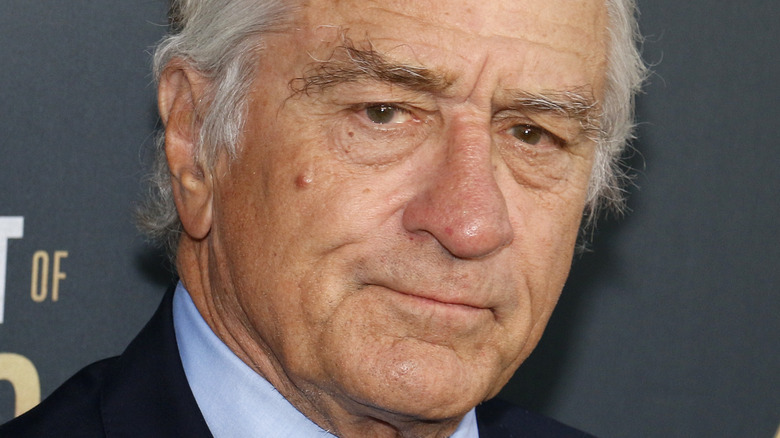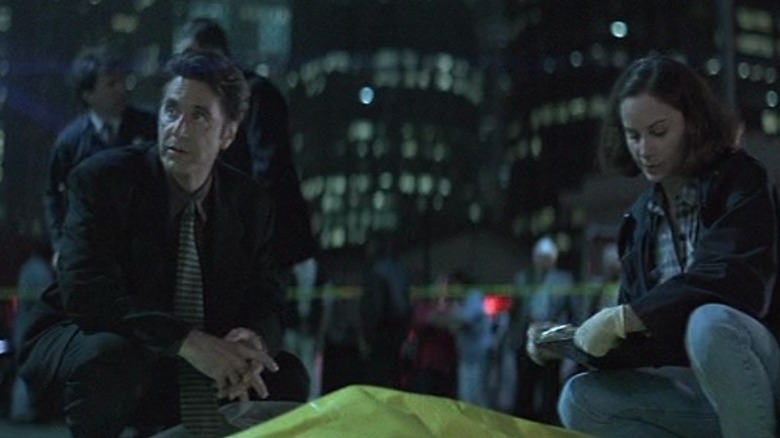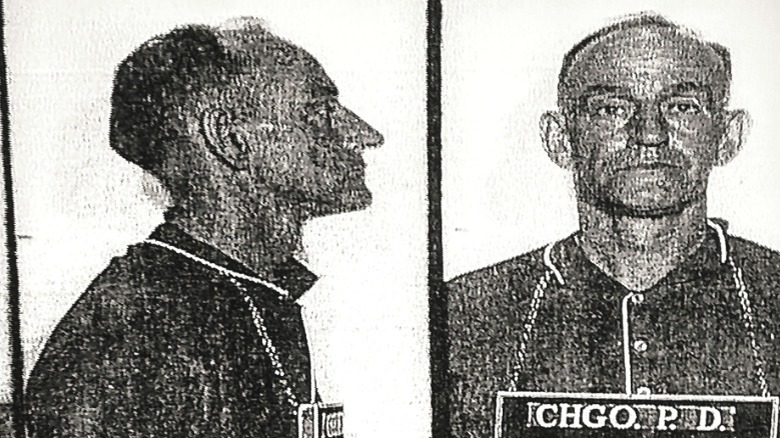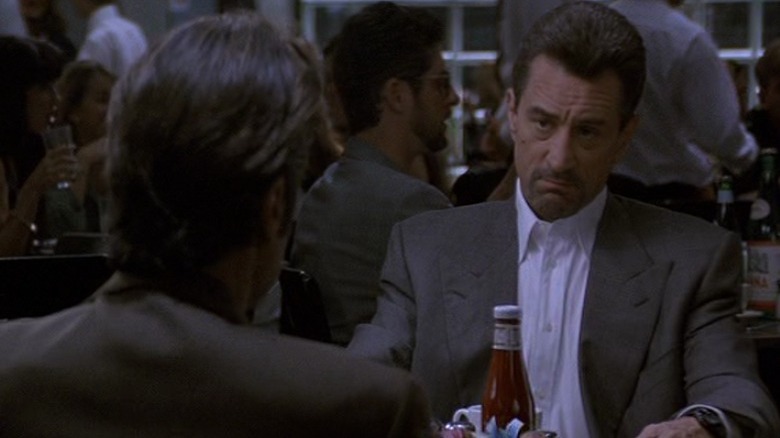How True Crime Inspired The Movie Heat
There have been many crime thriller movies in film history, and for good reason. People seem drawn to the criminal underworld on the silver screen, and all of the violence and action that entails. And with plenty of real-life material to draw inspiration from, it seems like there won't be any shortage of crime movies in the near future.
But, of course, one would be remiss if they did not bring up one of the most famous and influential crime movies of all time: "Heat." Directed by Michael Mann and released in 1995, "Heat" is the standard cops and robbers crime thriller, but with powerhouse leads Al Pacino as Lieutenant Vincent Hanna and Robert De Niro as the criminal Neil McCauley (via IMDb). The story is centered around McCauley's crew trying to do big money heists and robberies, while LAPD and Lieutenant Vincent Hanna are hunting them down.
While "Heat" has many fans and admirers, some may not know that the film was actually based on a real crime that happened. And, even more interesting, that McCauley was a real person too.
Why Heat is an important and influential film
"Heat" made a big splash in the world of film when it first came out. Though it didn't win any major awards, it spawned many homages and inspired quite a number of directors, according to GQ. Michael Mann's crime thriller is considered an absolute masterpiece in the genre, and has also inspired other forms of media like the hit video game series "Grand Theft Auto."
As GameSpot notes, "Grand Theft Auto V" takes direct inspiration from "Heat," such as a few of its robbery set pieces that mirror the movie almost exactly. Another such movie is "Baby Driver," which also takes cues from the film with its own stick-up scenes. Edgar Wright himself even called "Heat" the "granddaddy of heist movies" in his own Top 10 list of the genre. There are entire lists dedicated to ranking movies inspired by "Heat."
It's clear that Mann's movie is a staple in the crime film genre. It might have even inspired some real-life copycat crimes, as some other movies have.
The movie was based off an actual crime story
Many people might think that "Heat" is just a fictional film with no basis in reality, but the truth couldn't be any further. It turns out that Michael Mann actually used a real-life crime and detective chase as the basis for his movie. It all starts with a man named Chuck Adamson.
According to Film School Rejects, Adamson was a well-known scriptwriter in the 1980s, who was responsible for creating the hit 1986 show "Crime Story." This show was about a Chicago police detective tracking down organized crime members and solving street crime. Adamson also wrote a few episodes for another popular crime show, "Miami Vice," which ran from 1984 to 1989.
While Adamson's screenwriting career was undoubtedly impressive, that's not all he was known for in his life. He was also a real-life crime detective before he switched to television. As said by Steven Rybin in his book "The Cinema of Michael Mann," Adamson was a detective for the Chicago Police Department back in the 1960s. Mann happened to be friends with Adamson while he was writing the script for Heat, so Adamson recounted the time he once took down criminal Neil McCauley.
Neil McCauley went from poverty to big scores
Given that Chuck Adamson was a consultant on "Heat," his experiences were vital to the production. According to Film School Rejects, Adamson had been chasing the criminal Neil McCauley back in 1964. McCauley was a repeat offender, having been in jail multiple times in his youth. McCauley was the kind of criminal who didn't want to settle for peanuts, but big-time heists.
McCauley had never been terribly careful in terms of crime. This would later come back to bite him in the backside during his final heist. Adamson had been keeping tabs on McCauley closely, and as soon as he had left prison, he knew that McCauley would be up to no good again.
In the book "Focus On: 100 Most Popular 1990s Action Films," McCauley is described as initially having a middle-class upbringing, which all changed when his father died. McCauley, struggling to find work, found himself embroiled in a life of crime.
Neil McCauley's heists were awfully similar to Heat's
Neil McCauley's life of crime was filled with intense police chases and planned out heists. As said in the book "Focus On: 100 Most Popular 1990s Action Films," McCauley had spent a fair amount of time in the prisons McNeil and Alcatraz. This also happens to McCauley's character in the film "Heat," drawing a direct parallel from real life to fiction.
One of McCauley's biggest heists was at a diamond drill bit manufacturing company. He had outlined and organized the heist with some ex-cons he met, William Pinkerton and Michael Parille. The film recreated this heist almost exactly, with much of the same dialogue and methods being shown on screen.
As said by the New York Daily News, Chuck Adamson and McCauley actually met once coincidentally at a dry cleaner. McCauley was aware that Adamson was hunting him, but still had coffee with the cop.
McCauley's final heist ended in his death
Neil McCauley's luck couldn't last forever, however, and soon he would be planning his last heist. As said in "Focus On: 100 Most Popular 1990s Action Films," McCauley and his partners were planning to rob an armored car in Chicago on March 25, 1964. This would be one of his biggest heists ever and set him up with a fair amount of money.
As the Chicago Tribune states, they followed the armored car to the National Tea company. When they arrived, they held the entire place up, stealing what would be $120,000 in today's money. They were about to get away with it, but unfortunately for McCauley, Adamson and fellow policemen also arrived, leading to a big shootout. Bringing an end to his criminal career, McCauley was killed in the incident. All but one of the gang members were killed, and a chapter was forever closed in Chicago police history.
A lot of these story details found their way into "Heat," creating the authentic crime movie people know and love today. Sometimes crime doesn't pay, but making a movie about crime just might.





